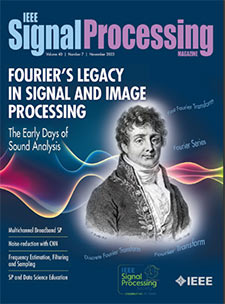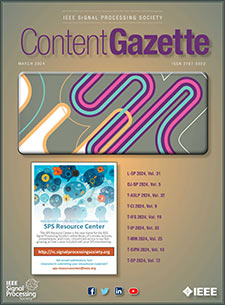- Our Story
- Publications & Resources
- Publications & Resources
- Publications
- IEEE Signal Processing Magazine
- IEEE Journal of Selected Topics in Signal Processing
- IEEE Signal Processing Letters
- IEEE/ACM Transactions on Audio Speech and Language Processing
- IEEE Transactions on Computational Imaging
- IEEE Transactions on Image Processing
- IEEE Transactions on Information Forensics and Security
- IEEE Transactions on Multimedia
- IEEE Transactions on Signal and Information Processing over Networks
- IEEE Transactions on Signal Processing
- IEEE TCI
- IEEE TSIPN
- Data & Challenges
- Submit Manuscript
- Guidelines
- Information for Authors
- Special Issue Deadlines
- Overview Articles
- Top Accessed Articles
- SPS Newsletter
- SigPort
- SPS Resource Center
- Publications Feedback
- Publications FAQ
- Blog
- News
- Dataset Papers
- Conferences & Events
- Community & Involvement
- Professional Development
- For Volunteers
- Information for Authors-OJSP
-
Home
Conferences14 April 2025 to 17 April 2025Conferences Events IEEE JSTSP Article IEEE Signal Processing Magazine IEEE TIFS Article IEEE TMM Article IEEE TSP Article Jobs in Signal Processing Lectures Machine Learning Seasonal Schools Signal Processing News SPM Article SPS Distinguished Lectures SPS Newsletter Article SPS Webinar SPS Webinars SPS Webinar Series Webinar webinars
-
Our Story
What is Signal Processing?

The technology we use, and even rely on, in our everyday lives –computers, radios, video, cell phones – is enabled by signal processing. Learn More » -
Publications & Resources
-
SPS Resources
- Signal Processing Magazine The premier publication of the society.
- SPS Newsletter Monthly updates in Signal Processing
- SPS Resource Center Online library of tutorials, lectures, and presentations.
- SigPort Online repository for reports, papers, and more.
- SPS Feed The latest news, events, and more from the world of Signal Processing.
-
SPS Resources
-
Conferences & Events
-
Community & Involvement
-
Membership
- Join SPS The IEEE Signal Processing Magazine, Conference, Discounts, Awards, Collaborations, and more!
- Chapter Locator Find your local chapter and connect with fellow industry professionals, academics and students
- Women in Signal Processing Networking and engagement opportunities for women across signal processing disciplines
- Students Scholarships, conference discounts, travel grants, SP Cup, VIP Cup, 5-MICC
- Young Professionals Career development opportunities, networking
- Get Involved
-
Technical Committees
- Applied Signal Processing Systems
- Audio and Acoustic Signal Processing
- Bio Imaging and Signal Processing
- Computational Imaging
- Image Video and Multidimensional Signal Processing
- Information Forensics and Security
- Machine Learning for Signal Processing
- Multimedia Signal Processing
- Sensor Array and Multichannel
- Signal Processing for Communication and Networking
- Signal Processing Theory and Methods
- Speech and Language Processing
- Technical Working Groups
- More TC Resources
-
Membership
-
Professional Development
-
Professional Development
- Mentoring Experiences for Underrepresented Young Researchers (ME-UYR)
- Micro Mentoring Experience Program (MiME)
- Distinguished Lecturer Program
- Distinguished Lecturers
- Distinguished Lecturer Nominations
- Past Lecturers
- Distinguished Industry Speaker Program
- Distinguished Industry Speakers
- Distinguished Industry Speaker Nominations
- Industry Resources
- IEEE Training Materials
- Jobs in Signal Processing: IEEE Job Site
-
Career Resources
- SPS Education Program Educational content in signal processing and related fields.
- Distinguished Lecturer Program Chapters have access to educators and authors in the fields of Signal Processing
- PROGRESS Initiative Promoting diversity in the field of signal processing.
- Job Opportunities Signal Processing and Technical Committee specific job opportunities
- Job Submission Form Employers may submit opportunities in the area of Signal Processing.
-
Professional Development
-
For Volunteers
-
For Board & Committee Members
- Board Agenda/Minutes* Agendas, minutes and supporting documentation for Board and Committee Members
- SPS Directory* Directory of volunteers, society and division directory for Board and Committee Members.
- Membership Development Reports* Insight into the Society’s month-over-month and year-over-year growths and declines for Board and Committee Members
-
For Board & Committee Members
Popular Pages
Today's:
- Submit a Manuscript
- Information for Authors
- (MLSP 2024) 2024 IEEE International Workshop on Machine Learning for Signal Processing
- (SLT 2024) 2024 IEEE Spoken Language Technology Workshop
- (ISBI 2025) 2025 IEEE International Symposium on Biomedical Imaging
- IEEE Transactions on Multimedia
- IEEE Transactions on Image Processing
- IEEE/ACM Transactions on Audio Speech and Language Processing
- IEEE Transactions on Information Forensics and Security
- IEEE Signal Processing Letters
- (ICASSP 2024) 2024 IEEE International Conference on Acoustics, Speech and Signal Processing
- Information for Authors-SPL
- Conferences & Events
- Conference Call for Papers
- 404 Page
All time:
- Information for Authors
- Submit a Manuscript
- IEEE Transactions on Image Processing
- 404 Page
- IEEE/ACM Transactions on Audio Speech and Language Processing
- IEEE Transactions on Information Forensics and Security
- IEEE Transactions on Multimedia
- IEEE Signal Processing Letters
- IEEE Transactions on Signal Processing
- Conferences & Events
- IEEE Journal of Selected Topics in Signal Processing
- Information for Authors-SPL
- Conference Call for Papers
- Signal Processing 101
- IEEE Signal Processing Magazine
Last viewed:
- (ICASSP 2025) 2025 IEEE International Conference on Acoustics, Speech and Signal Processing
- (ACSSC 2024) 2024 Asilomar Conference on Signals, Systems, and Computers
- Editorial Board
- IEEE Transactions on Image Processing
- Editorial Board Nominations
- Information for Authors
- Post Doctoral Position on GNSS Signal Processing, Universitat Autonoma de Barcelona
- IEEE Transactions on Multimedia
- SPS Webinar: Devising Transformers as an Autoencoder for Unsupervised Multivariate Time Series Imputation
- Award Recipients
- Editorial Board
- Submit a Manuscript
- New MD Kit Portal - Custom Orders Now Available
- IEEE Transactions on Signal Processing
- SPS Scholarship Program
Zhu, Zhenghan. University of Rhode Island (2017)"Some Contributions to Radar Detection Theory"
You are here
Newsletter Menu
Newsletter Categories
Top Reasons to Join SPS Today!
1. IEEE Signal Processing Magazine
2. Signal Processing Digital Library*
3. Inside Signal Processing Newsletter
4. SPS Resource Center
5. Career advancement & recognition
6. Discounts on conferences and publications
7. Professional networking
8. Communities for students, young professionals, and women
9. Volunteer opportunities
10. Coming soon! PDH/CEU credits
Click here to learn more.
News and Resources for Members of the IEEE Signal Processing Society
Zhu, Zhenghan. University of Rhode Island (2017)"Some Contributions to Radar Detection Theory"
Zhu, Zhenghan. University of Rhode Island (2017)"Some Contributions to Radar Detection Theory", advisor: Kay, Steven
This dissertation focuses on statistical signal processing theory and its applications to radar, complex-valued signal processing and model selection. The transmit signal critically affects a radar system’s performance. Its design is an important task and is an active research area. The authors provide an optimal design for detecting extended targets in colored noise based on the locally most powerful detector. The authors also establish a fundamental relationship between the Kullback-Leibler divergence, signal-to-noise ratio, and mutual information, all of which have been used as waveform design metrics the literature. The relationship explains the role of each metric. In space-time adaptive processing (STAP), the nonstationarity of the data samples causes a mismatch between the estimated covariance matrix and the true one, and consequently leads to the degradation of STAP performance. The authors propose an asymptotically optimal detector for testing the non-stationarity via the generalized likelihood ratio test and an alternative Rao test with lower computational cost. The Rao test is a very useful method in signal processing. A complex parameter Rao test is proposed and serves as a new method for complex-valued parameter testing. Different from the traditional way, it reformulates the calculations with respect to the complex-valued quantities directly and often leads to more intuitive, and more computationally efficient test statistics. Applying the complex parameter Rao test to the bandedness of the Cholesky factor of the inverse of a complex-valued covariance matrix is an example of its application. Model order selection is another fundamental but important task that arises in many areas. The authors propose a new Bayesian model order selection method by employing the exponentially embedded family (EEF) technique. In addition to the established important properties of EEF, the new Bayesian model selection method can use vague proper priors and improper non-informative priors without the criticisms of Lindley’s paradox and the Information paradox. The penalty term of the Bayesian EEF is shown to have a very intuitive meaning as the sum of the model parameter dimension and the estimated mutual information between the parameter and observed data. The EEF is also used to estimated the degree of noncircularity of a complex random vector and is shown to have good performance.
Open Calls
Conference News
Chapter & DL News
PhD Theses
- Kaewtip, Kantapon. University of California, Los Angeles(2017)"Robust Automatic Recognition of Birdsongs and Human Speech: a Template-Based Approach"
- Hossein Bashashati, University of British Columbia (2017) "A User-Customized Self-Paced Brain Computer Interface"
- Tralie, Christopher J.. Duke University(2017) "Geometric Multimedia Time Series"
- Jang, Hyungseok. (The University of Wisconsin - Madison), "Advances in Single Point Imaging for Electron Paramagnetic and Magnetic Resonance Imaging” (2017)
- Wisler, Alan. Arizona State University, (2017) "Graph-based Estimation of Information Divergence Functions"
Initiatives & Trends
Member Highlights
News & Announcements
Education & Resources
SPS on Twitter
- DEADLINE EXTENDED: The 2023 IEEE International Workshop on Machine Learning for Signal Processing is now accepting… https://t.co/NLH2u19a3y
- ONE MONTH OUT! We are celebrating the inaugural SPS Day on 2 June, honoring the date the Society was established in… https://t.co/V6Z3wKGK1O
- The new SPS Scholarship Program welcomes applications from students interested in pursuing signal processing educat… https://t.co/0aYPMDSWDj
- CALL FOR PAPERS: The IEEE Journal of Selected Topics in Signal Processing is now seeking submissions for a Special… https://t.co/NPCGrSjQbh
- Test your knowledge of signal processing history with our April trivia! Our 75th anniversary celebration continues:… https://t.co/4xal7voFER
Home | Sitemap | Contact | Accessibility | Nondiscrimination Policy | IEEE Ethics Reporting | IEEE Privacy Policy | Terms | Feedback
© Copyright 2024 IEEE – All rights reserved. Use of this website signifies your agreement to the IEEE Terms and Conditions.
A not-for-profit organization, IEEE is the world's largest technical professional organization dedicated to advancing technology for the benefit of humanity.







